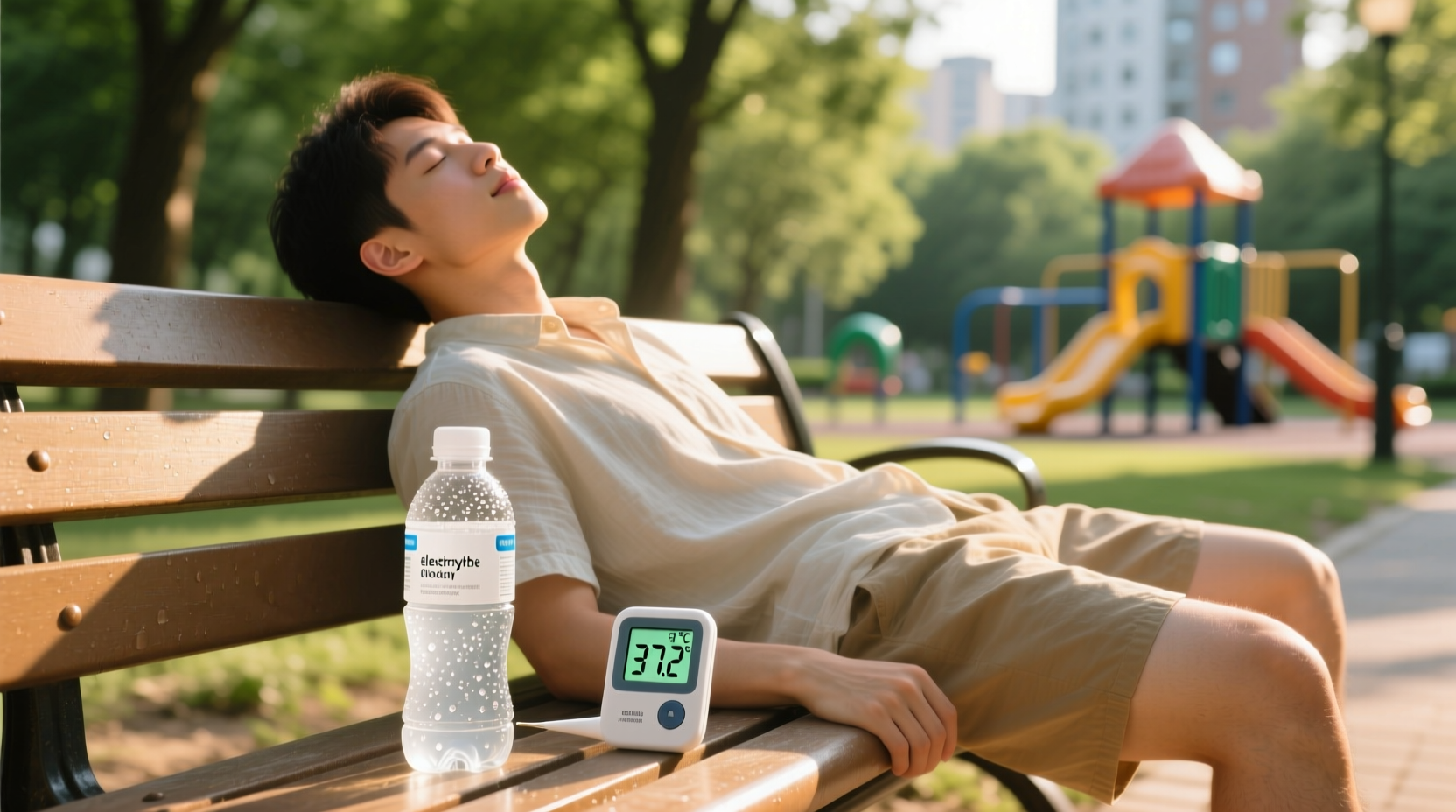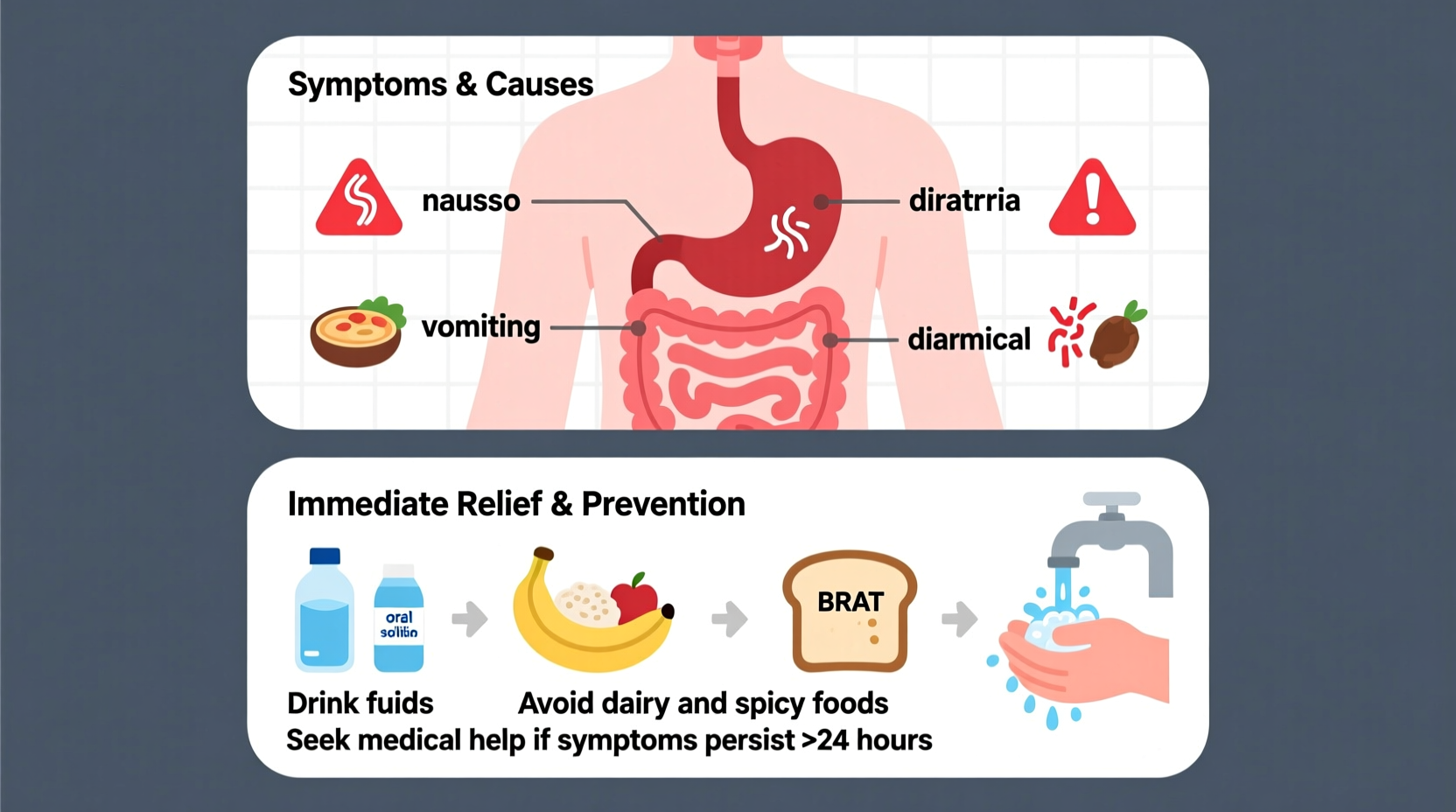If you're experiencing food poisoning, immediate action focuses on hydration and rest. Most cases resolve within 1-2 days with proper fluid replacement. Stop eating temporarily, sip electrolyte solutions every 15 minutes, and avoid anti-diarrheal medications unless approved by a healthcare provider. Seek emergency care if you experience bloody stool, high fever above 102°F (38.9°C), signs of severe dehydration, or symptoms lasting beyond 48 hours.
What to Do in the First Critical Hours
When food poisoning strikes, your initial response significantly impacts recovery time. The CDC reports that 48 million Americans experience foodborne illnesses annually, with most cases resolving through proper self-care. During the first 6 hours:
- Stop eating completely for 4-6 hours to allow your digestive system to rest
- Sip small amounts of clear fluids (2-4 tablespoons) every 15 minutes
- Prioritize electrolyte solutions over plain water to prevent dangerous imbalances
- Avoid dairy, caffeine, alcohol, and sugary drinks which worsen symptoms
Many people make the critical mistake of drinking large quantities at once, which often triggers additional vomiting. The CDC specifically recommends the gradual rehydration approach for optimal recovery.

Recovery Timeline: What to Expect Day by Day
Understanding the typical progression helps manage expectations and recognize warning signs. Based on clinical data from Mayo Clinic, here's what most people experience:
| Time Period | Symptoms | Recommended Actions |
|---|---|---|
| First 6-12 hours | Nausea, vomiting, abdominal cramps | Complete fasting, small sips of electrolytes, rest |
| 12-24 hours | Vomiting subsides, diarrhea begins | Introduce BRAT diet (bananas, rice, applesauce, toast), continue hydration |
| 24-48 hours | Gradual symptom improvement | Expand to bland foods, monitor for complications |
| 48+ hours | Full recovery for most cases | Resume normal diet gradually, maintain hydration |
This timeline applies to common bacterial causes like Salmonella and E. coli. Viral causes like norovirus typically resolve faster (12-60 hours), while C. botulinum requires immediate medical intervention. The NHS notes that approximately 90% of food poisoning cases resolve without medical treatment within 48 hours.
When Home Care Isn't Enough: Medical Intervention Guide
Recognizing when to seek professional help prevents complications. The following symptoms require immediate medical attention:
- Bloody or black stool indicating possible intestinal damage
- Fever exceeding 102°F (38.9°C)
- Symptoms persisting beyond 48 hours without improvement
- Signs of severe dehydration: minimal urination, dizziness, rapid heartbeat
- Numbness, blurred vision, or muscle weakness (possible botulism)
Medical professionals may administer intravenous fluids for severe dehydration. Antibiotics are only prescribed for specific bacterial infections like Shigella or Campylobacter, but can worsen conditions like E. coli O157:H7. The Mayo Clinic emphasizes that inappropriate antibiotic use can increase the risk of hemolytic uremic syndrome in certain infections.
Effective Hydration Protocols
Proper rehydration is the cornerstone of food poisoning treatment. The World Health Organization recommends:
- Oral rehydration solutions containing precise sodium-glucose ratios (commercial or homemade)
- Homemade solution: 6 level teaspoons sugar + 1/2 level teaspoon salt dissolved in 1 liter of clean water
- Sip slowly - 2-4 tablespoons every 15 minutes rather than large gulps
- Avoid sports drinks with excessive sugar that can worsen diarrhea
Clear broths provide both hydration and essential electrolytes. The WHO reports that proper oral rehydration therapy prevents 93% of dehydration-related deaths from diarrheal illnesses.
Reintroducing Food: The Strategic Approach
When symptoms begin improving, reintroduce foods strategically:
- Start with binding foods: Bananas, white rice, applesauce, toast (BRAT diet)
- Progress to bland proteins: Boiled chicken, steamed fish after 24 hours of symptom improvement
- Avoid high-risk foods for 3-5 days: Dairy, fatty foods, spicy dishes, raw vegetables
- Gradually reintroduce normal diet over 3-7 days as tolerated
Many people rush back to normal eating too quickly, triggering symptom recurrence. Registered dietitians recommend waiting until you've had 24 hours without vomiting before attempting solid foods.
Prevention Strategies for Future Protection
Understanding how food poisoning occurs helps prevent future episodes. Key prevention measures include:
- Temperature control: Keep cold foods below 40°F (4°C) and hot foods above 140°F (60°C)
- Proper handwashing: 20 seconds with soap before handling food
- Cross-contamination prevention: Separate raw meats from other foods
- Thorough cooking: Use a food thermometer to verify internal temperatures
The FDA Food Code specifies that poultry must reach 165°F (73.9°C), ground meats 155°F (68.3°C), and fish 145°F (62.8°C) to eliminate pathogens. These precise temperature guidelines significantly reduce foodborne illness risk.
Frequently Asked Questions
Can I take anti-diarrheal medication for food poisoning?
Only under medical guidance. Anti-diarrheals can trap harmful bacteria in your system, potentially worsening infections like E. coli. The CDC advises against using these medications during the initial 24-48 hours unless specifically recommended by a healthcare provider.
How long does food poisoning typically last?
Most cases resolve within 1-2 days. Viral causes like norovirus typically last 12-60 hours, while bacterial infections may persist 1-7 days. Seek medical attention if symptoms continue beyond 48 hours without improvement or if you experience severe symptoms like bloody stool or high fever.
What's the best drink for food poisoning recovery?
Oral rehydration solutions with the proper sodium-glucose balance are most effective. If unavailable, a homemade solution of 6 teaspoons sugar and 1/2 teaspoon salt per liter of clean water works well. Clear broths and diluted apple juice (50/50 with water) are acceptable alternatives. Avoid sports drinks with high sugar content as they can worsen diarrhea.
When should I see a doctor for food poisoning?
Seek immediate medical attention if you experience bloody or black stool, fever above 102°F (38.9°C), signs of severe dehydration (minimal urination, dizziness, rapid heartbeat), symptoms lasting beyond 48 hours, or neurological symptoms like blurred vision. Infants, elderly individuals, and those with compromised immune systems should consult a healthcare provider sooner.











 浙公网安备
33010002000092号
浙公网安备
33010002000092号 浙B2-20120091-4
浙B2-20120091-4